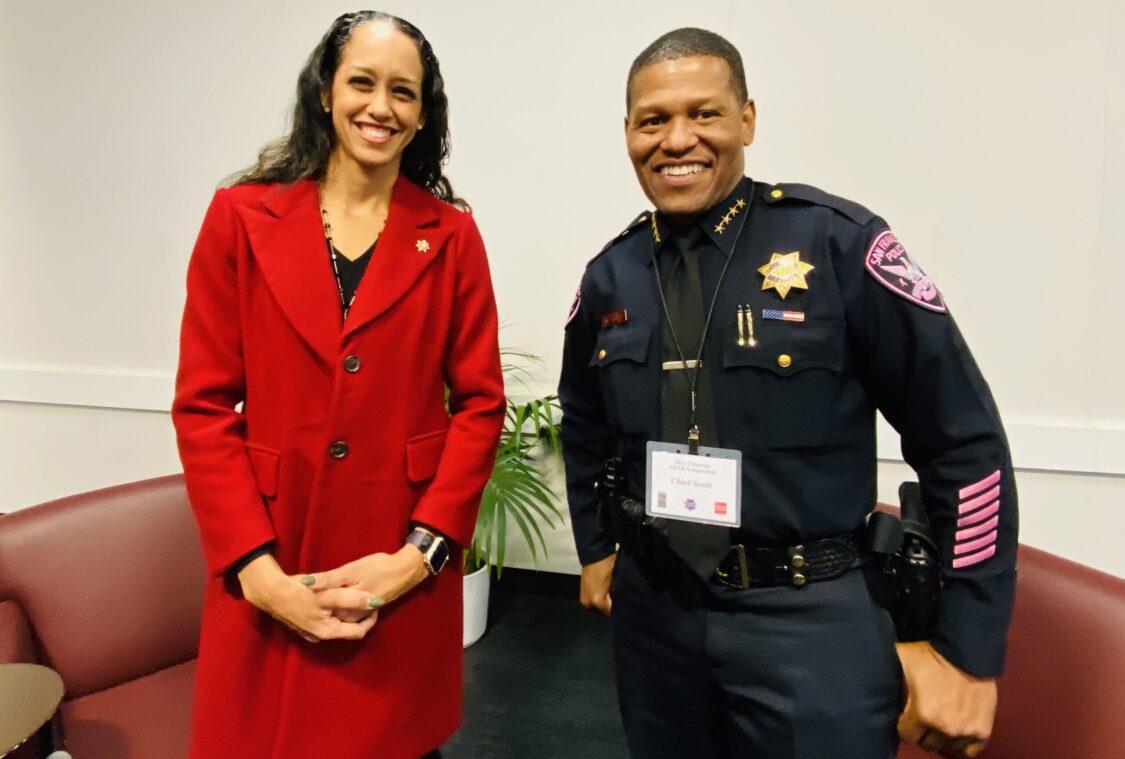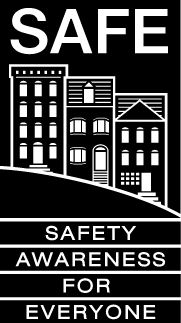Citywide CPAB Symposium Celebrates Power of Partnerships

SF SAFE brought together San Francisco Police Department (SFPD) Chief William Scott, department leadership, DA Brooke Jenkins and more than 100 Community Police Advisory Board (CPAB) members Sat., Oct. 22 for the latest Citywide CPAB Symposium at Wells Fargo.
Following a warm welcome from SF SAFE Executive Director Kyra Worthy, who organized the event with her team, Chief Scott remarked that the gathering was about “the power of partnerships,” namely law enforcement working collaboratively with CPAB members—who are San Francisco residents, employees and employers in their own right—to create a safer San Francisco. CPABs, which consist of community volunteers from throughout the city, meet regularly at each SFPD station to discuss and troubleshoot with law enforcement on local safety issues.
Chief Scott shared that he learned about the importance of CPABs and “partnering with the community” early in his career and how those long, early conversations about how they were going to make things better resonated with him in terms of “how important it is for us to work with people in the community that we serve.” He added, “To this day, I still hold that in my heart in terms of what it really takes to police a city effectively.”
During the action-packed CPAB Symposium, which extended throughout the day, SFPD leadership met in small breakout sessions with groups of CPAB members surrounding subjects relevant to their collective work. These discussion topics included: The CPAB Toolkit; CPAB Manuel; Setting Achievable Goals with Your Station Captain; Finding Resources for Issues in Your District; Planning for National Night Out (NNO) and Other Events; SFPD Community Policing Plan Review; SFPD Station Support Groups; and a Chat with Chief Scott.
In his breakout session, Chief Scott fielded questions from CPAB members in an up-close setting that afforded the volunteers quality time with him. CPAB member, Carol, from Russian Hill, raised familiar concerns about police staffing levels/recruitment, low morale and what can be done to help the department at this challenging time.
The chief shared that, following the George Floyd incident, there has been a nationwide decrease in the amount of people wanting to be police officers. “Our applicant pool is way down [and] recruitment is tough. You name the city, it’s the same issue,” he said. Amid the reality of the SFPD’s staff levels being down hundreds of officers, the chief said a big focus is on retaining the officers they have now, who already know how to do their jobs.
In terms of what can be done to help the police in the current climate, the chief said that “it’s a tough policing environment” and the best thing community members can do is to support the police. “I’m preaching to the choir,” said the chief to the CPAB members, “but just people showing up [to events like National Night Out and Officer Appreciation Day] and saying we support you guys…goes a long way in terms of policing.”
Another question raised in the chief’s breakout was if the SFPD has any programs that connect with kids in schools. While the chief said they do smaller things like read to kids in schools, he said that also following the George Floyd incident the San Francisco School Board voted to end the School Resource Officer (SRO) Program. “So that makes it really difficult for us to be in the schools,” he said. A CPAB member then alluded to the upcoming election that could change the political climate that initially led to this decision. As a side note, the chief added that they are working on building connections with SF STATE right now.
Over in Commander Julian Ng’s breakout session, which centered on the Community Policing Plan Review, the overriding message was that the SFPD is looking to get CPAB members more involved in the development of the plan. With the SFPD required to document all action items in its plan, and with community involvement also being required, the department is considering having CPAB members join subcommittees to help with its development.
Commander Ng emphasized one area of importance is more planning for events and documenting the metrics resulting from them, i.e., “How many people showed up? What are we going to do in the future?” He also aims to have SFPD captains to start using Microsoft Planner to better document the areas of focus and the action taken so that it’s “logged historically” and “will help with plan development” in the future. The commander also reminded CPAB members that the plan can be found on the SFPD’s website for easy public access.
For his part, Assistant Chief David Lazar ran the SFPD Station Support Groups breakout. During his breakout discussion, the assistant chief discussed the forms of station outreach and support. In response to an inquiry, he defined community policing as “problem solving.” He explained that if there’s a catalytic converter theft on Russian Hill, that’s a problem, where with problem-orientated policing, “the community and the police are going to roll up our sleeves together and we’re going to tackle this problem.”
He added that, at meetings, everyone contributes their ideas toward problem solving and eventually short-and-long-term responses are developed. “But you don’t get there until you have trust and legitimacy, and that’s why you host a community engagement,” such as a Coffee with a Cop event. “It’s hard to work together on the problem if we don’t know one another.”
Assistant Chief Lazar remarked, “And that’s what CPAB is about; we’re working together,” quickly pointing out an example of this kind of teamwork being SFPD Central Station CPAB having developed the well-known “Park Smart” campaign. In the future, the assistant chief said he is hoping to see CPAB meetings organized so that they have annual calendars and subcommittees that report back to the group on their respective assignments.
While other breakout discussions were afoot that day, the aforementioned ones offer a snapshot of some of the notable topics.
Upon returning from their breakout sessions to the general meeting room, Worthy introduced San Francisco District Attorney Brooke Jenkins, who sat down for a Q&A session with Chief William Scott.
Starting off with a warm welcome to the CPAB members, DA Jenkins said she is “Happy to answer any and all questions…as I try to do my best to balance the interest of making sure that anyone who’s accused of a crime is treated fairly in our system, but making sure that we also bring back some accountability in San Francisco that’s been lacking.”
She added that she appreciates that the chief, who she said she gets along with “very well,” and his command staff “have allowed us to press the reset button.”
Chief Scott remarked that “Our job is to do the best we can to give her prosecutors a good case…And then, when they do their jobs, it comes back to us in many, many ways—that gratification.”
“I can sit here and say these first three months have been really, really, really refreshing,” said the chief about working with the DA and her office of late. Getting drug dealers actually held in jail…very, very clearly, they’re there to work with us, not against us—and that makes all the difference in the world.”
During the Q&A, DA Jenkins and Chief Scott fielded inquiries from the CPAB members on a variety of topics, spanning from station captain changeovers to sideshows to recruitment, drug arrests, violence intervention, collaborative justice, San Francisco’s public image and more.
“I’m doing my best to let them know, despite still loving [Sheriff] Paul Miyamoto, that there’s a new sheriff in town,” said DA Jenkins in response to a question touching on some of the city’s persistent crime issues, such as open drug use, tainting its public image.
Following the Q&A, a gentleman CPAB member stood up and congratulated SF SAFE’s Kyra Worthy and her team for an “outstanding symposium,” which participants left with gift boxes and raffle prizes courtesy of the organization in appreciation for their volunteerism.
“Thanks to all of you guys and community members for participating and giving up most of your Saturday,” said Worthy. “And so, we’ll do it again next year!”
